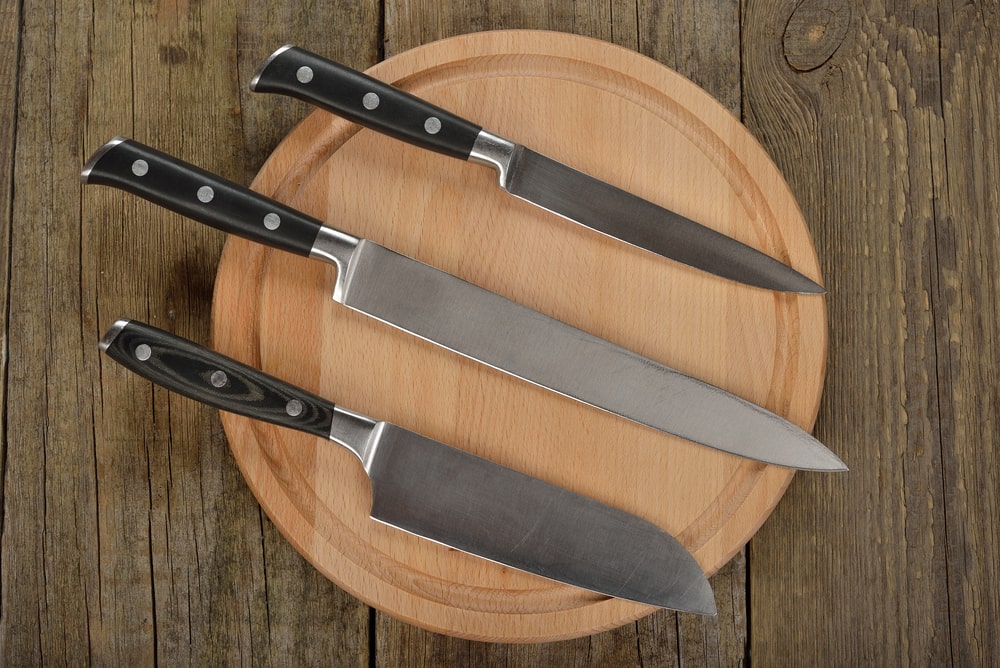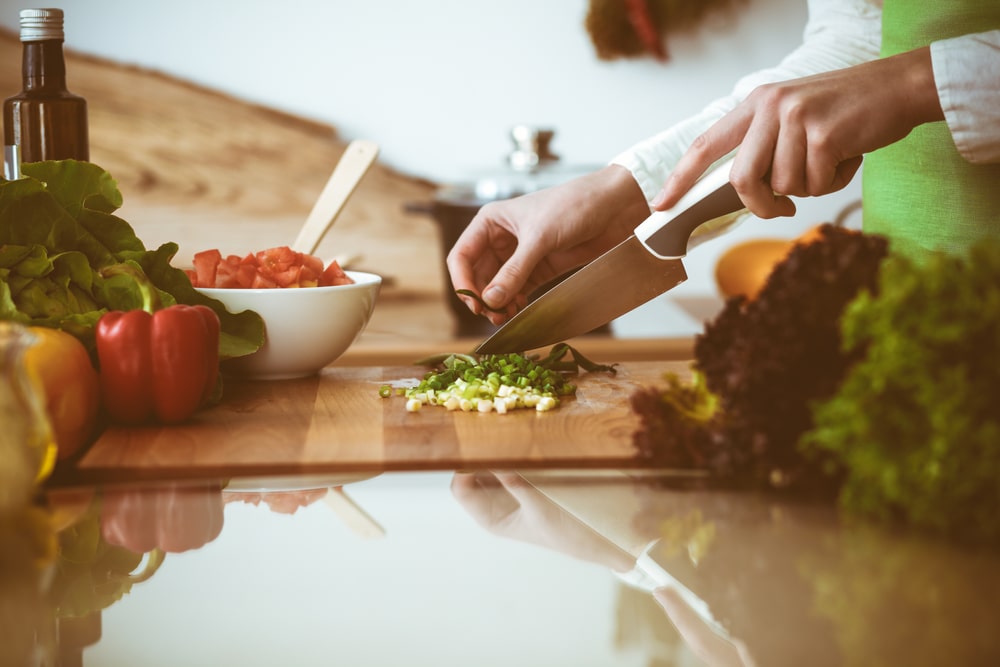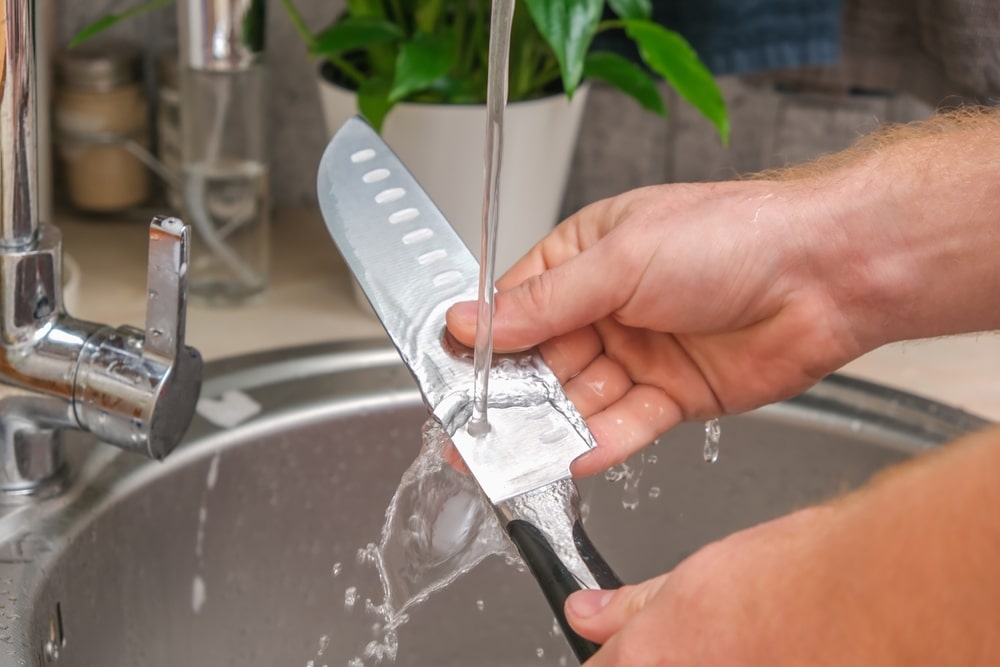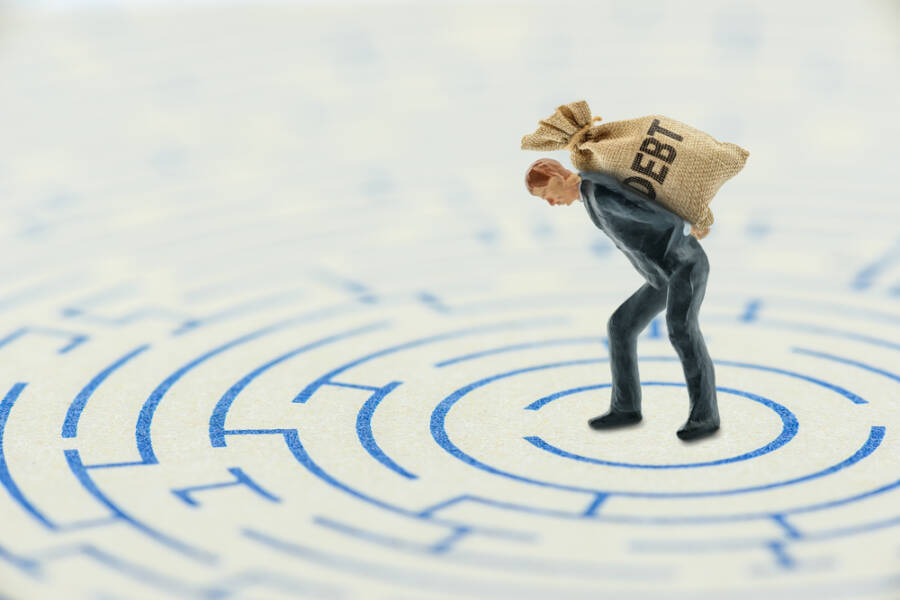Do you know how to make your favorite kitchen knives last longer? Here’s how:
You surely have a lot of kitchen knives to help you slice your veggies, cube meat, mince garlic, and peel off fruits, but over time, your utensils can get dull. All that heavy usage can turn your tools into chipped, dull, and rusted blades, but we know some easy ways you can protect them.
With a little TLC, you can use your kitchen knives for years to come. Whether you use a fancy Japanese-style chef’s knife, choose a Western-made blade, or usually go for a combination of these two, you’ll find this article useful.
If you want to know how to protect your favorite kitchen knives and make them last longer, here are all the tips you need! Let’s begin!

1. Sharpen them the right way
One of the most important things when it comes to making your kitchen knives last longer is learning how to sharpen them correctly. A sharp knife can be dangerous if not used properly (that sharp blade can cause serious damage if you’re not careful), but an unsharpened one is even clumsier. Your tool will be hard to use, and you’ll have to apply more force than necessary to slice or mince something.
You can easily avoid this problem by using the right tools to sharpen your kitchen knives. We suggest using either an electric sharpener or a whetstone but keep in mind that the latter isn’t always as precise as the former.
You might find several Internet guides explaining the process of honing your whetstone skills, or you can give your neighborhood knife store a call to find out whether they offer sharpening services or not. If you’re looking for an amazing knife-sharpening set to keep your utensils in good condition, here’s one that we love!
2. Pay attention to where you store them
You might be disappointed to read this, but it won’t work to tuck your knife, unsheathed, into a drawer (apologies, we couldn’t resist). It’s not difficult to see what would happen if someone carelessly reached into that drawer. It’s not only unsafe but storing it in this manner can harm the blade, and you’ll have to purchase new kitchen knives to replace your old ones.
If you don’t want to waste money and prefer to take care of the utensils you already have, you can easily measure the area on your counter to determine the best type of knife storage for you. Blades can be kept out of sight with a knife block, but if you don’t have enough counter space, you can try hanging them from a magnetic strip.

3. Check your cutting boards
If you want to protect your kitchen knives and use them for longer, another thing you have to do is to avoid cutting your food on surfaces that are harder than the steel of your utensil, as they will eventually damage the blade. For example, experts say that you shouldn’t use glass chopping boards. At all.
Besides that, you might want to steer clear of using your favorite kitchen knives on ceramic, granite, and marble surfaces. You can choose wood or paper composites instead, such as Epicurean boards, which are especially well-suited for knives. They’re long-lasting, storable, and heat-resistant, and they’re also dishwasher-safe.
4. How do you slice and dice?
Some people might feel nervous when they use a big knife, because they might not hold it correctly, or they have no idea what to do with the other hand to avoid a dangerous situation. These emotions are quite normal, and we have some solutions.
You should avoid moving the knife vertically up and down while cutting as this can weaken the blade as it hits your cutting board. If you choose a cutting board that is made of paper-composite material, you should slice and sway while rocking the knife back and forth so that it gently slices against the board. This will provide a soft yet secure landing point, which will protect your favorite kitchen knives in the long run.
With your other hand, place it firmly above the thing you’re cutting, and don’t forget to curl your fingertips inward so the knife will scrape your knuckles as you chop. Always be safe!
5. Don’t use them for other purposes
You wouldn’t measure a teaspoon of olive oil with a wooden spoon or frost a delicious cake with a fork. So why would you pick up the stuff you just sliced by scraping your knife on the chopping board? Use a bench scraper for the job. It was made for this, and it works wonders. Many people do this (including us), but it’s one of the worst things you could do for your knives’ blades.
Another mistake many people make is trying to open a can with a knife. Let your knife be your knife—a reliable dicer, chopper, and slicer that you can always rely on in your kitchen.

6. Wash and dry
How do you take care of your favorite kitchen knives after you’re done using them? The correct answer is this: wash and dry them. Make sure you use a non-scratch sponge to clean your knife, along with warm water and dish soap, so it is nice and fresh again. If you use a sponge that has an abrasive side made of aluminum oxide, it can dull your edge and cause scratches on your blade. Use a cotton kitchen towel to dry your knife, and make sure you store it somewhere safe.
While it might not seem like such a big deal to let your knives air dry or wait in the sink until you’re ready to do the dishes, your utensils can suffer rust stains, discolorations, and more from simply being left out on the counter or in the sink with all the other filthy dishes. Even though this problem can be taken care of, don’t waste time and money, and better yet, clean and dry your knives after each use.
7. Skip the dishwasher
Long story short, your dishwasher is a hurricane of extremely hot, abrasive detergent and water. While this combination is wonderful for your plates, bowls, silverware, and other utensils, you should avoid putting your kitchen knives in there. They might get chipped, dulled, or corroded, and you’ll need to invest in new ones.
Even if your blade magically emerges from the dishwasher undamaged, the high heat and damp conditions will quickly eat away at the epoxy that keeps your handle together. So go back to the previous tip: hand wash gently and then dry.
8. Use mineral oil
Another tip you can use to make your kitchen knives last forever is to use mineral oil. Only a drop or two of food-grade mineral oil throughout the blade and the handle can protect your trusted blade from responding to highly acidic foods like lemons and limes. Another reason why this technique is so effective is that it will prevent salty or acidic solutions from removing the free chromium coating from your blade. In simpler words, this can prevent rust and patina from doing their annoying work.
Not only is food-grade mineral oil excellent for routine knife maintenance, but it can also reverse the patina on stainless steel blades. For example, this great mineral oil will do the task and be quite beneficial to your cutting board. If your knife is a high-carbon, “non-stainless” blade, you should apply a layer of food-grade mineral oil after every single use so that you keep corrosion at bay.
If your favorite kitchen knives already present signs of corrosion, you can try and remove those stains with mineral oil. If that doesn’t work, you can try to use a metal polish that is suitable for your kitchen utensils.
Do you have any other tips on how to make your kitchen knives last forever? Let us know in the comments below! If you enjoyed reading this article and you’d like to check out something else from Frugal Americans, here’s a good post for you: 8 Best Amazon Buying Tricks That Can Help You Save Money














